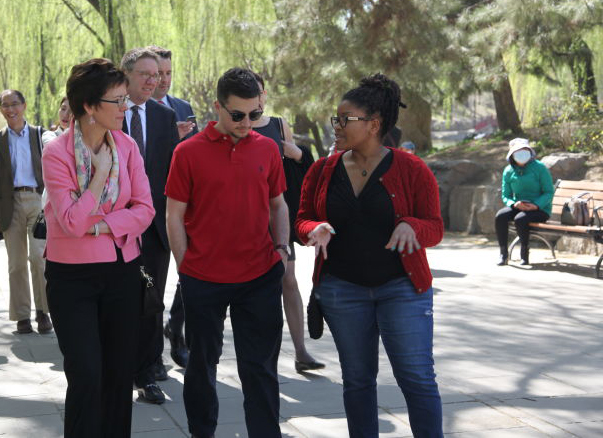China & Asia-Pacific Studies Program celebrates 10 years
By Linda B. Glaser

On April 1, the 10th anniversary of the China and Asia-Pacific Studies (CAPS) Program at Cornell was observed in China with a visit to Beijing by Gretchen Ritter ’83, the Harold Tanner Dean of the College of Arts and Sciences; Laura Spitz, vice provost for international affairs; and Frederick Van Sickle, vice president for Alumni Affairs and Development. Their visit included meetings with top-level administrators of Peking University and the School of International Studies. They also met informally with the five CAPS majors currently studying in Beijing.
Alumni, faculty and students celebrated CAPS’ 10th anniversary in a daylong conference last September, “The Past, Present and Future of China and Asia-Pacific Studies at Cornell University.”
“CAPS began as a vision of Michael Zak,” said CAPS Director Andrew Mertha, professor of government. “He issued a wake-up call: that the study of the relations between China, the United States and the Asia-Pacific [region] was too important to leave to amateurs.”
Zak ’75 said he realized the need for something like CAPS in 1972, when he was an engineering student at Cornell. “We were at the end of a long, painful war that had been fought essentially over a set of misunderstandings [arising from a misinterpretation of China’s relationship with Vietnam]. As a nation the U.S. needed to make a fundamental commitment to understand China better and so did I.”
Fast-forward 27 years. Post-9/11, it was clear to Zak that the U.S. still didn’t understand China. Zak proposed to then-Cornell President Hunter Rawlings that Cornell leverage its tradition of excellence in East Asian and China studies to help build a new generation of China experts.
And CAPS was born.
“It took a lot of work to get it underway, most of it done by Professor Sherman Cochran,” recalled Zak, who noted the Faculty Senate approved the new major by a unanimous vote, an unusual occurrence. Cochran, the Hu Shih Professor of Chinese History, developed Zak’s idea into a curriculum and later served as a director of CAPS. Chen Jian, one of the world’s leading China experts, was recruited as CAPS’ first director and appointed the Michael J. Zak Professor of History for U.S.-China Relations.
“Sino-U.S. relations are by far the most important bilateral relationship in the world,” says Mertha. “CAPS is designed to train the next generation of young China hands who appreciate the complexities involved. They gain firsthand, hard experience combined with linguistic skills and professional experience hon the ground. They graduate with a skill set that they can immediately apply.”
Said Ritter, “The issues that face us today and their global ramifications – like climate change, cybersecurity and economic development – tell us it is crucial to understand China and China’s relationship to the world for our own sake as well as for the sake of the world.”
High-quality language instruction is at the core of the CAPS program, taught by instructors in the Asian studies department and CAPS language instructors in Beijing and Washington, D.C. Students graduate at a proficiency level that enables them to use the language in their work and daily life in China.
“This was evident in our interactions with CAPS students at Beida last week,” said Spitz. “To a person, they emphasized their deep commitment to Chinese language learning. Many identified it as their primary reason for enrolling in CAPS.”
The number of China scholars in the government department has doubled since the CAPS program began. This year, two additional world-class experts were added, notes Mertha: Jessica Chen Weiss and Jeremy Wallace, both associate professors of government. “Their appointments help make Cornell the epicenter in the study of Chinese politics in the United States at both the undergraduate and graduate levels,” says Mertha. “CAPS has allowed us to have the most robust Chinese politics area of any government department in the country, with the largest number of faculty specializing in China of any American political science department in the country.”
CAPS students see their education mattering on the large scale. As Cole Devoy ’17 notes, “An engaged, really well-studied group of China scholars … is crucial to making sure the U.S.-China relationship is not only strong but peaceful in the 21st century.”
Linda B. Glaser is a staff writer for the College of Arts and Sciences.
Media Contact
Get Cornell news delivered right to your inbox.
Subscribe